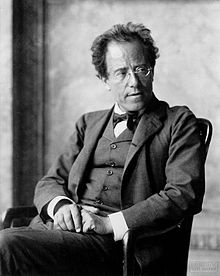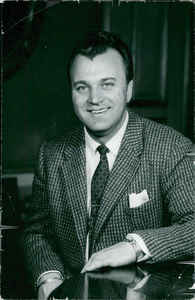This Week in Classical Music: July 5, 2021.Mahler and Gedda.Gustav Mahler’s birthday is on July 7th.He was born in 1860 in Bohemia (then part of the Austria-Hungary, now the Czech Republic), into a poor German-speaking Jewish family.We’ve written about Mahler many times; his music was slow in acceptance, to a large extent because of its complexity and new nature, but also, in the 1930s and 1940s, for political and ethnic reasons. Mahler became extremely popular in the second half of the 20th century, but it seems that now, again, his music is fading somewhat.We think of it as a litmus test, this time more cultural than political.The changes are especially obvious in radio programming: there was a time when WFMT, a premier classical music station, would broadcasts his symphonies on a regular basis, and especially onhis birthday.Now you will only hear Mahler when WFMT runs special programs, such as old recorded concerts of the symphony orchestras or programs like Henry Fogel’s “Collectors’ Corner.”We don’t know the exact reasons for this – it’s difficult to imagine that WFMT just decided that people stopped loving Mahler’s music.We can only surmise that Mahler’s symphonies are too long and don’t allow for many commercial interruptions, that they are too complex (WFMT, like many other stations, has been trending toward simpler music for years), and that WFMT need more airtime for women composers.Of course, there may also be personal biases at play or other reasons we’re not aware of.But in the end, the results are obvious: Mahler’s music, if not directly banned, is relegated.This is unfortunate and, we hope, will be reversed in the future.In the meantime, here is the fourth movement, Adagio. Sehr langsam und noch zurückhaltend, from Mahler’s Symphony no. 9.Pierre Boulez conducts the Chicago Symphony.
Nicolai Gedda, born on July 11th of 1925 in Stockholm, was one of the best operatic tenors of the mid-20th century.Gedda had a rather unusual biography.He was born out of wedlock; his mother was a 17-year-old Swedish waitress, his father – an unemployed half-Russian, half-Swede. He was raised by his aunt on his father’s side, who was born in Riga, and her husband, Mikhail Ustinoff, a Russian Cossack (and a relative of the famous actor Peter Ustinov).Gedda’s biological parents lived in the same house, but he thought they were his aunt and uncle.Gedda grew up bilingual, speaking Swedish and Russian; he would later turn into a veritable polyglot, learning (and performing operas in) French, German, Italian, English, and Czech, in addition to his native Swedish and Russian.He studied singing in Stockholm with Carl Martin Oehman, a Swedish tenor and singing teacher, who “discovered” Jussi Björling.Gedda made his debut in the Royal Swedish Opera in 1951.Two years later he was already singing in La Scala (Don Ottavio in Mozart’s Don Giovanni).Through his meeting with Walter Legge, who was extremely impressed by Gedda’s singing, he got a recording contract with HMV (His Master’s Voice).In 1954, Gedda moved to Paris, where he sung at the Opéra and in many concerts and festivals.His Covent Garden debut followed the next year and, in 1957, he debuted at the Met, where he sung for 22 seasons.Gedda’s repertoire was remarkably broad: he sung Italian and Russian operas, the Frenchmen Gounod, Berlioz and Biset, he was great in Mozart and operas by the Soviet composers: Shostakovich’s Lady MacBeth of Mtsensk and Prokofiev’s War and Peace.He sung the role of Lohengrin and was a great proponent of the German Lied and Russian Orthodox songs.Gedda sung beautifully well into his 70s.Here is Nicolai Gedda brilliantly singing the aria Salut! Demeure chaste et pure from Gounod’s Faust in the 1978 recording.Andre Cluytens is conducting the Paris Opera orchestra.
Mahler and Gedda, 2021
This Week in Classical Music: July 5, 2021. Mahler and Gedda. Gustav Mahler’s birthday is on July 7th. He was born in 1860 in Bohemia (then part of the Austria-Hungary, now the Czech Republic), into a poor German-speaking Jewish family. We’ve written about Mahler many times; his music was slow in acceptance, to a large extent because of its complexity and new nature, but also, in the 1930s and 1940s, for political and ethnic reasons. Mahler became extremely popular in the second half of the 20th century, but it seems that now, again, his music is fading somewhat. We think of it as a litmus test, this time more cultural than political. The changes are especially obvious in radio programming: there was a time when WFMT, a premier classical music station, would broadcasts his symphonies on a regular basis, and especially onhis birthday. Now you will only hear Mahler when WFMT runs special programs, such as old recorded concerts of the symphony orchestras or programs like Henry Fogel’s “Collectors’ Corner.” We don’t know the exact reasons for this – it’s difficult to imagine that WFMT just decided that people stopped loving Mahler’s music. We can only surmise that Mahler’s symphonies are too long and don’t allow for many commercial interruptions, that they are too complex (WFMT, like many other stations, has been trending toward simpler music for years), and that WFMT need more airtime for women composers. Of course, there may also be personal biases at play or other reasons we’re not aware of. But in the end, the results are obvious: Mahler’s music, if not directly banned, is relegated. This is unfortunate and, we hope, will be reversed in the future. In the meantime, here is the fourth movement, Adagio. Sehr langsam und noch zurückhaltend, from Mahler’s Symphony no. 9. Pierre Boulez conducts the Chicago Symphony.
Republic), into a poor German-speaking Jewish family. We’ve written about Mahler many times; his music was slow in acceptance, to a large extent because of its complexity and new nature, but also, in the 1930s and 1940s, for political and ethnic reasons. Mahler became extremely popular in the second half of the 20th century, but it seems that now, again, his music is fading somewhat. We think of it as a litmus test, this time more cultural than political. The changes are especially obvious in radio programming: there was a time when WFMT, a premier classical music station, would broadcasts his symphonies on a regular basis, and especially onhis birthday. Now you will only hear Mahler when WFMT runs special programs, such as old recorded concerts of the symphony orchestras or programs like Henry Fogel’s “Collectors’ Corner.” We don’t know the exact reasons for this – it’s difficult to imagine that WFMT just decided that people stopped loving Mahler’s music. We can only surmise that Mahler’s symphonies are too long and don’t allow for many commercial interruptions, that they are too complex (WFMT, like many other stations, has been trending toward simpler music for years), and that WFMT need more airtime for women composers. Of course, there may also be personal biases at play or other reasons we’re not aware of. But in the end, the results are obvious: Mahler’s music, if not directly banned, is relegated. This is unfortunate and, we hope, will be reversed in the future. In the meantime, here is the fourth movement, Adagio. Sehr langsam und noch zurückhaltend, from Mahler’s Symphony no. 9. Pierre Boulez conducts the Chicago Symphony.
Nicolai Gedda, born on July 11th of 1925 in Stockholm, was one of the best operatic tenors of the mid-20th century. Gedda had a rather unusual biography. He was born out of wedlock; his mother was a 17-year-old Swedish waitress, his father – an unemployed half-Russian, half-Swede. He was raised by his aunt on his father’s side, who was born in Riga, and her husband, Mikhail Ustinoff, a Russian Cossack (and a relative of the famous actor Peter Ustinov). Gedda’s biological parents lived in the same house, but he thought they were his aunt and uncle. Gedda grew up bilingual, speaking Swedish and Russian; he would later turn into a veritable polyglot, learning (and performing operas in) French, German, Italian, English, and Czech, in addition to his native Swedish and Russian. He studied singing in Stockholm with Carl Martin Oehman, a Swedish tenor and singing teacher, who “discovered” Jussi Björling. Gedda made his debut in the Royal Swedish Opera in 1951. Two years later he was already singing in La Scala (Don Ottavio in Mozart’s Don Giovanni). Through his meeting with Walter Legge, who was extremely impressed by Gedda’s singing, he got a recording contract with HMV (His Master’s Voice). In 1954, Gedda moved to Paris, where he sung at the Opéra and in many concerts and festivals. His Covent Garden debut followed the next year and, in 1957, he debuted at the Met, where he sung for 22 seasons. Gedda’s repertoire was remarkably broad: he sung Italian and Russian operas, the Frenchmen Gounod, Berlioz and Biset, he was great in Mozart and operas by the Soviet composers: Shostakovich’s Lady MacBeth of Mtsensk and Prokofiev’s War and Peace. He sung the role of Lohengrin and was a great proponent of the German Lied and Russian Orthodox songs. Gedda sung beautifully well into his 70s. Here is Nicolai Gedda brilliantly singing the aria Salut! Demeure chaste et pure from Gounod’s Faust in the 1978 recording. Andre Cluytens is conducting the Paris Opera orchestra.
tenors of the mid-20th century. Gedda had a rather unusual biography. He was born out of wedlock; his mother was a 17-year-old Swedish waitress, his father – an unemployed half-Russian, half-Swede. He was raised by his aunt on his father’s side, who was born in Riga, and her husband, Mikhail Ustinoff, a Russian Cossack (and a relative of the famous actor Peter Ustinov). Gedda’s biological parents lived in the same house, but he thought they were his aunt and uncle. Gedda grew up bilingual, speaking Swedish and Russian; he would later turn into a veritable polyglot, learning (and performing operas in) French, German, Italian, English, and Czech, in addition to his native Swedish and Russian. He studied singing in Stockholm with Carl Martin Oehman, a Swedish tenor and singing teacher, who “discovered” Jussi Björling. Gedda made his debut in the Royal Swedish Opera in 1951. Two years later he was already singing in La Scala (Don Ottavio in Mozart’s Don Giovanni). Through his meeting with Walter Legge, who was extremely impressed by Gedda’s singing, he got a recording contract with HMV (His Master’s Voice). In 1954, Gedda moved to Paris, where he sung at the Opéra and in many concerts and festivals. His Covent Garden debut followed the next year and, in 1957, he debuted at the Met, where he sung for 22 seasons. Gedda’s repertoire was remarkably broad: he sung Italian and Russian operas, the Frenchmen Gounod, Berlioz and Biset, he was great in Mozart and operas by the Soviet composers: Shostakovich’s Lady MacBeth of Mtsensk and Prokofiev’s War and Peace. He sung the role of Lohengrin and was a great proponent of the German Lied and Russian Orthodox songs. Gedda sung beautifully well into his 70s. Here is Nicolai Gedda brilliantly singing the aria Salut! Demeure chaste et pure from Gounod’s Faust in the 1978 recording. Andre Cluytens is conducting the Paris Opera orchestra.